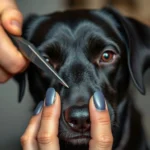
Introduction
Understanding your dog’s health is crucial for their well-being, especially for breeds like the Shih Tzu. Known for their charming personalities and distinctive appearances, Shih Tzus are beloved companions. However, their unique characteristics, particularly their brachycephalic (flat-faced) structure, come with specific health considerations. One behavior that often raises eyebrows among Shih Tzu owners is snorting. Understanding why does a Shih Tzu snort is essential for ensuring your furry friend remains healthy and happy.
Understanding Shih Tzu Anatomy
Unique Physical Characteristics
Shih Tzus are characterized by their short noses, large eyes, and compact bodies, which contribute to their adorable appearance. However, this brachycephalic structure can lead to various respiratory issues. The shortened nasal passages can restrict airflow, making it difficult for them to breathe, especially during physical activity or in hot weather.
Common Health Issues in Shih Tzus
The unique anatomy of Shih Tzus predisposes them to several health issues. Respiratory conditions are common, and snorting often indicates an underlying problem. Regular veterinary check-ups are essential for early detection and management of these issues. Owners should be aware of the potential for conditions like Brachycephalic Obstructive Airway Syndrome (BOAS), allergies, and other respiratory problems that may arise due to their anatomy.
Reasons for Snorting in Shih Tzus
Normal Behavior
Snorting in Shih Tzus can often be attributed to normal behavior. Many Shih Tzus snort when they are excited, during playtime, or when they’re trying to communicate with their owners. This sound, while sometimes alarming, is usually harmless and a part of their charming personality.
Environmental Factors
Several environmental factors can lead to increased snorting in Shih Tzus. Allergens like pollen, dust, and mold can irritate their nasal passages, causing them to snort. Additionally, temperature extremes and high humidity can exacerbate respiratory issues. Exercise and activity levels also play a role; overexertion can lead to snorting as they struggle to catch their breath.
Health Concerns
While normal behavior is a common cause of snorting, health issues must not be overlooked. Here are some potential health concerns that may lead to snorting in Shih Tzus:
-
Brachycephalic Obstructive Airway Syndrome (BOAS): This condition is prevalent in brachycephalic breeds and can cause significant breathing difficulties. Symptoms include snorting, snoring, and labored breathing.
-
Allergies: Shih Tzus are prone to environmental allergies, which can cause nasal congestion and snorting. Common allergens include pollen, dust mites, and certain foods.
-
Nasal Congestion or Infections: Just like humans, dogs can suffer from colds or sinus infections that lead to snorting. If your Shih Tzu has a runny nose or seems lethargic, it could be a sign of an infection.
-
Other Respiratory Issues: Conditions such as kennel cough or bronchitis can also cause snorting, especially if accompanied by coughing or lethargy.
When to Consult a Veterinarian
Recognizing Signs of Concern
While snorting can be a normal behavior, certain signs indicate a need for veterinary intervention. Persistent snorting, particularly if accompanied by difficulty breathing, lethargy, or loss of appetite, warrants a trip to the vet. Monitoring changes in your dog’s behavior, such as increased snorting frequency or changes in breathing patterns, is essential for timely diagnosis and treatment.
What to Expect During a Veterinary Visit
During a veterinary visit, your vet will conduct a thorough examination, which may involve listening to your dog’s lungs and heart. They may recommend diagnostic tests such as X-rays, allergy tests, or even a rhinoscopy (a procedure to examine the nasal passages) to determine the underlying cause of the snorting. Understanding the examination process can help alleviate any anxiety you may feel about visiting the vet.
Preventative Health Care for Shih Tzus
Regular Vet Check-ups
Regular veterinary check-ups are crucial for maintaining your Shih Tzu’s health. These visits allow for routine health assessments that can identify potential issues before they become serious. A recommended vaccination and health screening schedule tailored to your Shih Tzu’s needs ensures they stay protected against common diseases.
Proper Care and Maintenance
Maintaining your Shih Tzu’s health goes beyond veterinary visits. Grooming is essential, particularly for this breed, which requires regular brushing to prevent matting. Mats can lead to skin infections and other health issues. Additionally, dental care is vital, as dental disease can contribute to systemic health problems. Regular teeth brushing and dental check-ups can significantly impact your Shih Tzu’s overall health.
Nutrition and Diet
Proper nutrition is fundamental for the health of your Shih Tzu. A balanced diet tailored to their specific needs can help prevent obesity, a common issue in this breed. Foods that are too high in fat or carbohydrates may exacerbate respiratory issues. It’s crucial to avoid certain foods that can lead to allergies or digestive problems, such as fillers like corn and soy. Consulting with your veterinarian about the best diet for your Shih Tzu can help set them on the path to a healthier life.
Home Remedies and Solutions
Environmental Adjustments
Making simple adjustments in your home can significantly reduce allergens and irritants that may cause snorting in your Shih Tzu. Regularly cleaning your living space, using air purifiers, and maintaining a dust-free environment can help minimize exposure to allergens. Additionally, avoiding smoking around your dog and keeping them away from strong odors or fumes can further enhance their respiratory health.
Natural Remedies
For mild snorting, some natural remedies may provide relief. Steam inhalation can help clear nasal passages. Simply running a hot shower and allowing your Shih Tzu to sit in the bathroom (while supervised) can create a steam-filled environment that helps open their airways. However, always consult your veterinarian before trying any home remedies, especially if your dog has a pre-existing condition.
When considering alternative therapies, acupuncture may be beneficial for some dogs. While more research is needed, many pet owners have reported positive results with acupuncture for breathing issues in their Shih Tzus.
Conclusion
Understanding why does a Shih Tzu snort is crucial for responsible pet ownership. By recognizing the normal behaviors, environmental factors, and potential health concerns associated with snorting, owners can take proactive steps to ensure their Shih Tzus remain healthy. Regular veterinary visits, proper care, and awareness of their unique needs are essential components of Shih Tzu health care. Prioritizing your dog’s health not only enhances their quality of life but also strengthens the bond you share.
Resources
Recommended Veterinarians and Clinics
Finding a veterinarian who specializes in brachycephalic breeds can make a significant difference in the health care of your Shih Tzu. Look for clinics with experience in managing the unique needs of these dogs.
Further Reading
Educating yourself about Shih Tzu health care through articles and studies can provide valuable insights. Books dedicated to dog health and wellness can also be beneficial resources for any dog owner.
Support Groups and Communities
Connecting with other Shih Tzu owners through online forums or local groups can provide support and share valuable information about caring for your furry friend. Engaging with a community of fellow Shih Tzu enthusiasts can enhance your understanding and approach to their health care.









